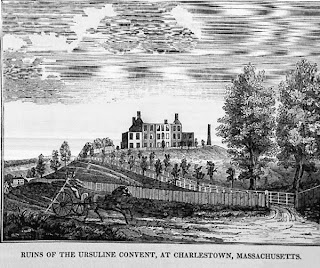The Ursuline convent on Mount Benedict in Charlestown, Massachusetts, was the realization of a dream of the Rev. John Thayer (1758 – 1815), a Protestant who converted to Catholicism and served as a priest in Boston from 1788 until 1792. The final years of his life were spent in Ireland, where he procured funds for establishing a convent in Boston. The funds that Thayer collected were remitted to the care of the Rev. Dr. Francis Anthony Matignon (1753 – 1818), who encouraged his parishioners in Boston to contribute to the project. The convent, however, did not become a reality until 1817, when the Rev. John Lefebvre de Cheverus (1768 – 1836), Bishop of Boston, got behind the effort. The Ursulines soon outgrew their original quarters and removed to a new edifice on Mount Benedict in July 1828.
Today marks the beginning of a two-day riot in Charlestown, Massachusetts, that was inspired by anti-Catholic sentiment. Catholic University’s Archives has the following to say about the convent and the riot:
The original members of the religious community were recruited by Thayer during his fundraising campaign in Limerick, Ireland. There he inspired two of the original founders, Mary and Catherine Ryan, to make their novitiate under the Ursulines of Three Rivers, Canada, which was a branch of the Ursulines of Quebec. Soon the convent consisted of ten sisters, the majority of them coming to Boston from Quebec including the Superior, Mother Mary Edmond St. George.
The Ursuline community’s principal mission was to administer a boarding school for girls aged six to fourteen. The number of students rose to 55, a few of whom were French-Canadian, while the greater number were children of New England Protestants. The education was comprehensive, covering religion, classics, music, and social graces.
Public opinion soon was to rise against the Ursulines and their school. The revival of evangelical Protestantism in the early 1800s, plus disdain for working-class Irish immigrants, gave rise to militant anti-Catholicism and reemphasis on traditional nativism. The convent was an obvious target, and rumors spread that the Ursulines were mistreating their students. When the townspeople gathered at the gates of the building on August 11, 1834, they proceeded to burn down the convent without interference from authorities.After the fire the Ursulines attempted to continue their work in Roxbury, Massachusetts. Once again they were harrassed. As a result, some of the religious decided to return to Quebec, and others joined the Ursulines of New Orleans. In 1838, an attempt was made to restore the Ursuline community in Boston, but there were no accessions to their ranks. Two years later, their Bostonian ministry was disbanded.












